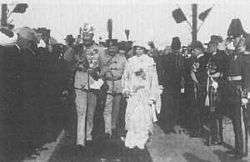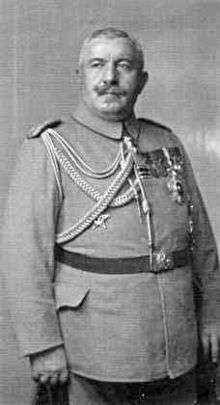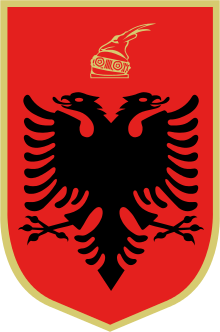Peasant Revolt in Albania
| The Peasant Revolt in Albania | |||||
|---|---|---|---|---|---|
.jpg) Hendrik Reimers, Dutch captain of the International Gendarmerie, captured by rebels (June 1914) | |||||
| |||||
| Belligerents | |||||
|
|
| ||||
| Commanders and leaders | |||||
| Haxhi Qamili, Arif Hiqmeti, Musa Qazimi and Mustafa Ndroqi | |||||
| Units involved | |||||
| |||||
The Peasant Revolt in Albania,[1][2] or the Muslim Uprising in Albania, was the uprising of peasants from central Albania, mostly Muslims, against the regime of Prince Wilhelm of Wied during 1914, and was one of the reasons for the prince's withdrawal from the country, marking the fall of the Principality of Albania.[3] The revolt was led by Muslim leaders Haxhi Qamili, Arif Hiqmeti, Musa Qazimi and Mustafa Ndroqi.[4] As well as total amnesty, the rebels demanded the return of Albania to the suzerainty of the Sultan of the Ottoman Empire.
Background

Prince Wilhelm of Wied took the throne of Principality of Albania on March 7, 1914, and had to face a chaotic political situation, both within the country and with its neighbours.[5] Based on the Treaty of London signed on May 30, 1913, the Great Powers resolved on July 29, 1913 that they should establish International gendarmerie to take care about public order and security on the territory of newly recognized Principality of Albania.[6] On the same basis they established International Commission of Control on October 15, 1913, to take care of the administration of newly established Albania until its own political institutions were in order.[7]
Prince Wilhelm of Wied had to deal with a difficult political situation:[8]
- Essad Pasha Toptani, who dominated new government of the Principality of Albania because he was both minister of interior and minister of war. By choosing to reside in Durres instead in Shkodër, the prince of Wied was at mercy of Essad Pasha.[9]
- the International Commission of Control and foreign advisers who still had great deal of authority
- the representatives of Austria-Hungary and Italy
- the resistance in Northern Epirus, which was finally given a special administration by Protocol of Corfu
- the fighting between forces under control of Essad Pasha Toptani and the Provisional Government of Albania[9]
- the major peasant revolt of mostly pro-Ottoman Muslim peasants.
There were numerous armed groups in Principality of Albania during regime of prince Wilhelm:[10]
- the International Gendarmerie under control of the International Commission of Control and prince Wilhelm
- the irregular bands of southerners led by local leaders
- the native outlaw
- the Bulgarian outlaw, Komitadjis
- the Greek rebels from the Northern Epirus
- the peasant rebels in central Albania
- Essad Pasha's gendarmerie
- the Romanian volunteers
- the Austro-Hungarian volunteers
- the volunteers from Kosovo led by Isa Boletini[11]
- the Mirdita Catholic volunteers from the northern mountains under the command of Prênk Bibë Doda[12]
Essad Pasha Toptani, as minister of war and interior, was against peaceful solution of problem with Northern Epirote Declaration of Independence of February 28, 1914. He opposed International Commission of Control which believed that problem can be solved by diplomatic means. Prince and his cabinet accepted proposals of Essad Pasha to decide for military solution. In order to increase the military strength of the Principality of Albania, several thousand Italian rifles and Austrian machine and mountain guns were purchased and distributed to the (predominantly Muslim) population of the central Albania.
Events
The plot of pro-Ottoman Albanians
In November 1913 the Albanian pro-Ottoman forces had offered the throne of Albania to the Ottoman war minister of Albanian origin, Izzet Pasha.[13] The Ottoman Empire sent agents to encourage a revolt, hoping to restore Ottoman suzerainty over Albania.[14] Izzet Pasha sent major Beqir Grebenali, another ethnic Albanian, to be one of his chief representatives in Albania. The Provisional Government of Albania under control of Ismail Qemali captured and executed major Beqir Grebenali. Such provocative and damaging display of independence of Qemali's government angered Great Powers and International Commission of Control forced Qemali to step aside and leave Albania.[15] At that time the Commission was not able to force Essad Pasha to leave Albania, because it did not have enough authority.
Revolt

The pro-Ottoman peasants believed that the new regime of the Principality of Albania was a tool of the six Christian Great Powers and the landowners that owned half of the arable land.[16] Revolt was led by Muslim leaders Haxhi Qamili, Arif Hiqmeti, Musa Qazimi and Mustafa Ndroqi.[17] This group of discontented Muslim clerics gathered around Essad Pasha Toptani who proclaimed himself the savior of Albania and Islam.[18]
After receiving the news that thousands of rebels surrounded Shijak on May 17 (only 10 km from Durres), Essad Pasha Toptani was accused of fomenting the revolt against William of Wied.[19] He was exiled to Italy on May 20, without trial.[20][21] In Italy, he was received with honor since both Italian and Austrian representatives played roles in intrigues that surrounded the revolt.[22]
The chaos and revolts deteriorated after Essad Pasha was exiled.[23] In order to gain support of the Mirdita Catholic volunteers from the northern mountains Prince of Wied appointed their leader, Prênk Bibë Doda, to be the foreign minister of the Principality of Albania. The International Dutch Gendarmerie was also joined by Isa Boletini and his men, mostly from Kosovo.[24] Dutch gendarmes together with northern Mirdita Catholics attempted to capture Shijak, but when they engaged the rebels on May 23, they were surrounded and captured, as well as another expedition from Durres which attempted to release the captured gendarmes. Rebels launched the attack on Durres and even started firing on it with their light weapons. The people in Durres panicked and Prince and his family found shelter on an Italian ship anchored in the bay.[25]
On the same evening the rebels released Dutch officer and sent him to Prince of Wied with their demands:[26]
- total amnesty
- return of Albania under suzerainty of sultan of Ottoman Empire
On 14 August, the rebels attacked the capital, which was protected mainly by Romanian and Austrian volunteers. The first insurgent attack lasted half an hour and was repulsed with heavy losses for the attackers. The second attack began after an hour, and lasted also for an hour, before it was once again repulsed, mainly due to the brave actions of the Romanians, who were greatly praised by their Christian Albanian comrades. After half an hour, the insurgents launched their third and final attack, but they were repelled everywhere by stiff Romanian resistance.[27]
Prince of Wied appointed Colonel Thomson to be commander of defence of Durrës. He was killed on June 15, during one attack of rebels. During next week Dutch officers were captured by rebels in most of the central Albania. The rebels captured Berat on July 12 and Vlore, without fight, on August 21.[28]
Only a week after prince Wilhelm of Wied's departure from Durres on September 3, 1914, another violent revolt arose. The rebels managed to lay siege on Durres, imprison Wied's supporters, to call for Muslim prince and to establish the Senate for Central Albania.[29] Insurgents hoisted the flag of the Ottoman Empire.[30] Vast majority of population living in the northern and the southern part of Albania disassociated themselves from the Senate of Central Albania.[31]
Aftermath

Dutch officers were gradually replaced with officers from Austria-Hungary and Germany, who arrived in Durrës on July 4.[32] Soon the First World War broke out and by August 4 most of Dutch officers returned to Netherlands. In autumn 1914 Essad Pasha decided to accept invitation of Senate of the Central Albania to return to Albania to take over the power.[33] First, he had to provide financial backing for his government. Therefore, he travelled to Niš, Kingdom of Serbia, where he and Serbian prime minister Pašić signed the secret treaty of Serbian-Albanian alliance on September 17, 1914.[34] In October 1914 Essad Pasha returned to Albania. With Italian and Serbian financial backing he established armed forces in Dibër and captured interior of Albania and Dures.
See also
References
- ↑ Jelavich, Barbara (1999) [1983], History of the Balkans: Twentieth century, 2, Cambridge, UK: The Press Syndicate of the University of Cambridge, p. 103, ISBN 0-521-27459-1, retrieved January 25, 2011,
Soon the government was faced with major peasant revolt
- ↑ "Fighting in Albania, The armistice broken". The Advertiser. Adelaide: 15. 1914. Retrieved January 25, 2011.
Essad Pasha wished to obtain the Crown of Albania, and the peasants' revolt as well as Arif Hikmet's actions were his work.
- ↑ Heaton-Armstrong, Duncan (2005). 2011-1-25 "An Uprising in the Six-Month Kingdom" Check
|archiveurl=value (help). Gervase Belfield and Bejtullah Destani (IB Tauris, in association with the Centre for Albanian Studies). Archived from the original on January 25, 2011. Retrieved January 25, 2011.Muslim uprising in central Albania, one of the factors that led to the Prince’s withdrawal from the country and the fall of the so-called six-month kingdom on the eve of the First World War.
- ↑ "The Efforts to settle amputated Albania state". albaniainbrief.com. Archived from the original on January 28, 2011. Retrieved January 28, 2011.
Thousands of muslim peasants, …were exploited by their leaders Haxhi Qamili, Arif Hiqmeti, Musa Qazimi and Mustafa Ndroqi, …to rebel
- ↑ Elsie, Robert. "Albania under prince Wied". Archived from the original on January 25, 2011. Retrieved January 25, 2011.
Wied agreed to accept the Albanian throne, and arrived in Durrës on 7 March 1914… The chaotic political situation both within Albania and with Albania’s neighbours
- ↑ Elsie, Robert. "Albania under prince Wied". Archived from the original on January 25, 2011. Retrieved January 25, 2011.
they reached a formal decision on 29 July 1913 that Albania would be an autonomous, sovereign and hereditary principality… newly recognized principality of Albania needed not only a sovereign, but also fixed borders, a government and… public order and security should be assured by an internationally organised gendarmerie.
- ↑ Zaharia, Perikli (March 24, 2003). "The post-1989 constitutional course of south east europe". Athens: Centre for European Constitutional Law. Archived from the original on January 22, 2011. Retrieved January 22, 2011.
Treaty of May 30, 1913. As it was decided at the London Conference of Ambassadors, the sovereignty of Albania was under the protection of the six great powers: Austria, England, France, Germany, Italy and Russia. At the same time, an International Control Commission was created.
- ↑ Jelavich, Barbara (1999) [1983], History of the Balkans: Twentieth century, 2, Cambridge, UK: The Press Syndicate of University of Cambridge, p. 103, ISBN 0-521-27459-1, retrieved January 25, 2011
- 1 2 Vickers, Miranda (1999). The Albanians: a modern history. IB Tauris. p. 83. ISBN 978-1-86064-541-9.
- ↑ Heaton-Armstrong, Duncan (2005). "An Uprising in the Six-Month Kingdom". Gervase Belfield and Bejtullah Destani (I.B. Tauris, in association with the Centre for Albanian Studies). Archived from the original on January 25, 2011. Retrieved January 25, 2011.
Southerners, whose local leaders... irregular bands ..native and Bulgarian “Komitadjis” (an outlaw or brigand)...“Royal” (Essad Pasha’s Own) mounted gendarmes.. Epirotes...troops... peasants...insurgents
- ↑ Elsie, Robert. "Albania under prince Wied". Archived from the original on January 25, 2011. Retrieved January 25, 2011.
volunteers from Kosova under their leader Isa Boletini
- ↑ Elsie, Robert. "Albania under prince Wied". Archived from the original on January 25, 2011. Retrieved January 25, 2011.
volunteers from Catholic Mirdita and the northern mountains under Simon Doda, nephew of Prenk Bibë Doda
- ↑ Elsie, Robert. "Albania under prince Wied". Archived from the original on January 25, 2011. Retrieved January 25, 2011.
pro-Ottoman forces ...were opposed to the increasing Western influence ...In November 1913, these forces, ..., had offered the vacant Albanian throne to General Izzet Pasha ... War Minister who was of Albanian origin.
- ↑ Vickers, Miranda (1999). The Albanians: a modern history. I.B.Tauris. p. 81. ISBN 978-1-86064-541-9.
... hopes of restoring Ottoman suzerainty over Albania.... sent agents to encourage insurrection
- ↑ Vickers, Miranda (1999). The Albanians: a modern history. I.B.Tauris. p. 82. ISBN 978-1-86064-541-9.
plot was discovered by Ismail Kemal's agents; one of the Porte's chief representatives, Major Beqir Grebnali... executed
- ↑ Jelavich, Barbara (1999) [1983], History of the Balkans: Twentieth century, 2, Cambridge, United Kingdom: The Press Syndicate of University of Cambridge, p. 103, ISBN 0-521-27459-1, retrieved January 25, 2011,
peasants..willing listeners to Ottoman propaganda... attached the new regime as a tool of the beys and Christian powers
- ↑ "The Efforts to settle amputated Albania state". albaniainbrief.com. Archived from the original on January 28, 2011. Retrieved January 28, 2011.
Thousands of muslim peasants,...were exploited by their leaders Haxhi Qamili, Arif Hiqmeti, Musa Qazimi and Mustafa Ndroqi, ...to rebel
- ↑ Vickers, Miranda (1999). The Albanians: a modern history. I.B.Tauris. p. 81. ISBN 978-1-86064-541-9.
He gathered round him a group of discontented Muslim priests ... and proclaimed himself the savior of Albania and the Champion of Islam.
- ↑ Elsie, Robert. "Albania under prince Wied". Archived from the original on January 25, 2011. Retrieved January 25, 2011.
It was obvious to Wied and the Dutch officers that Essad Pasha had his hand in the unrest.
- ↑ Heaton-Armstrong, Duncan (2005). "An Uprising in the Six-Month Kingdom". Gervase Belfield and Bejtullah Destani (I.B. Tauris, in association with the Centre for Albanian Studies). Archived from the original on January 25, 2011. Retrieved January 25, 2011.
Essad would be sent into exile, without a trial.
- ↑ Elsie, Robert. "Albania under prince Wied". Archived from the original on January 25, 2011. Retrieved January 25, 2011.
to exile Essad Pasha to Italy
- ↑ Jelavich, Barbara (1999) [1983], History of the Balkans: Twentieth century, 2, Cambridge, United Kingdom: The Press Syndicate of University of Cambridge, p. 103, ISBN 0-521-27459-1, retrieved January 25, 2011,
The Italian and Austrian representatives played roles in intrigues surrounding this event...to Italy, and there received with honor.
- ↑ Vickers, Miranda (1999). The Albanians: a modern history. I.B.Tauris. p. 85. ISBN 978-1-86064-541-9.
- ↑ Elsie, Robert. "Albania under prince Wied". Archived from the original on January 25, 2011. Retrieved January 25, 2011.
... mostly volunteers from Kosova under their leader Isa Boletini
- ↑ Elsie, Robert. "Albania under prince Wied". Archived from the original on January 25, 2011. Retrieved January 25, 2011.
Panic broke out in Durrës, and the royal family sought refuge on an Italian vessel ....
- ↑ Elsie, Robert. "Albania under prince Wied". Archived from the original on January 25, 2011. Retrieved January 25, 2011.
total amnesty and the restoration of the sultan...
- ↑ "Românul" newspaper, 9/22 august 1914 edition (Romanian)
- ↑ Elsie, Robert. "Albania under prince Wied". Archived from the original on January 25, 2011. Retrieved January 25, 2011.
situation was not much better for the Dutch officers in the other parts of the country. ...Berat fell to the rebels on 12 July and Vlora was occupied without a struggle on 21 August.
- ↑ Vickers, Miranda (1999). The Albanians: a modern history. I.B.Tauris. p. 85. ISBN 978-1-86064-541-9.
Barely a week after Wied's departure yet another violent revolt, this time led by supporters of Young Turks, laid siege on Durres. The rebels raised Ottoman flag, imprisoned Wied's supporters and called for, upon other things, a Muslim prince.... the insurgents set up a Senate for Central Albania
- ↑ Bataković, Dušan T., "Serbian government and Essad Pasha Toptani", The Kosovo Chronicles, Belgrade, Serbia: Knižara Plato, ISBN 86-447-0006-5, archived from the original on January 19, 2011, retrieved January 19, 2011,
The insurgents hoisted the Turkish flag.
- ↑ Vickers, Miranda (1999). The Albanians: a modern history. I.B.Tauris. p. 86. ISBN 978-1-86064-541-9.
vast majority of northern and southern Albanians disassociated themselves from the actions of the Senate.
- ↑ Elsie, Robert. "Albania under prince Wied". Archived from the original on January 25, 2011. Retrieved January 25, 2011.
Dutch officers ... were gradually replaced by... German and Austrian officers who arrived in Durrës on 4 July
- ↑ Bataković, Dušan T., "Serbian government and Essad Pasha Toptani", The Kosovo Chronicles, Belgrade, Serbia: Knižara Plato, ISBN 86-447-0006-5, archived from the original on January 19, 2011, retrieved January 19, 2011,
The senate of free towns in central Albania invited Essad Pasha to take over power.
- ↑ Bataković, Dušan T., "Serbian government and Essad Pasha Toptani", The Kosovo Chronicles, Belgrade, Serbia: Knižara Plato, ISBN 86-447-0006-5, archived from the original on January 19, 2011, retrieved January 19, 2011,
Essad Pasha signed a secret alliance treaty with Pasic on September 17.
External links
- Elsie, Robert. "Albania under prince Wied". Archived from the original on January 25, 2011. Retrieved January 25, 2011.
- Heaton-Armstrong, Duncan (2005). "An Uprising in the Six-Month Kingdom". Gervase Belfield and Bejtullah Destani (I.B. Tauris, in association with the Centre for Albanian Studies). Archived from the original on January 25, 2011. Retrieved January 25, 2011.
- Hans-Jürgen Krüger (2005). "Wilhelm Fürst von Albanien, Prinz zu Wied, Von Fürst Friedrich Wilhelm zu Wied und Heinz Schwarz". Wied family web-site. Archived from the original on January 25, 2011. Retrieved January 25, 2011.
- "Fighting in Albania, The armistice broken". The Advertiser, Adelaide: 15. 1914. Retrieved January 25, 2011.
- Colonel Thomson and Albania, Harrie Teunissen

